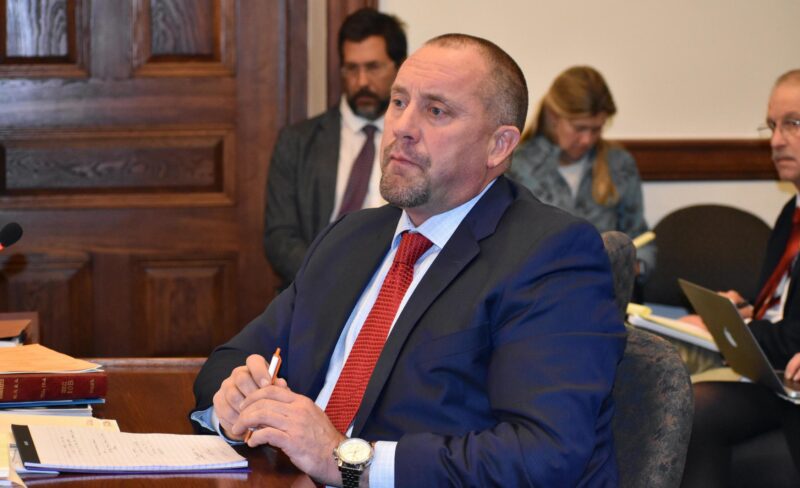A budget that will guide the next two years of spending in Maine passed the Legislature late last month without expanded funding for legal services for low-income Mainers. The decision opens the door further to litigation if lawmakers cannot resolve a decade of underfunding for a mandatory state service.
Lawmakers committed $17.6 million to the Maine Commission on Indigent Legal Services, or MCILS, in each of the next two budget years. Most of that will be spent to reimburse private defense attorneys contracted with the state to represent those who cannot afford to hire their own lawyers.
Commissioners who oversee the state agency unanimously supported a $35.4 million budget proposal in October 2020. The plan would have greatly expanded the agency’s work and piloted the state’s first public defender office. The proposal gained some initial support in a legislative policy committee last month, but its fate is now uncertain after lawmakers rushed to pass a budget that would take effect in 90 days without considering most policy initiatives. The appropriations committee will take up the request in the coming weeks as it continues to revise and add to the budget, legislative leadership said.
“We absolutely need more than what was appropriated to us in the budget that just passed,” said former lawmaker and commission chair Josh Tardy.
The agency’s four staff members are working “beyond maximum capacity,” Tardy said. He and Justin Andrus, the interim director, met virtually with Gov. Janet Mills in early April to appeal for more funding. The administration agreed to allow MCILS to hire four short-term employees, Andrus said, to begin addressing a backlog of statutory requirements neglected by the agency.
The new people are a bandaid that will not solve any of the commission’s funding problems, Tardy said.
MCILS has repeatedly been criticized by the state government for lax financial oversight of contracted attorneys. It also failed to verify appointments by court clerks, who made at least 2,000 case assignments to lawyers who were not properly screened by MCILS for having the necessary training and experience, an investigation by The Maine Monitor and ProPublica showed in February.

The ACLU of Maine is developing a lawsuit against MCILS and agreed to pay $1,500 for public records, said its chief legal counsel, Zach Heiden. The chapter warned for at least 15 months that it would sue unless MCILS improved the training, supervision and quality of legal services that contracted defense attorneys provide to the state’s poor.
“We don’t really see any alternative to bringing litigation at this point,” Heiden said. “I don’t have faith that it’s going to get fixed until a court says that the status quo is unconstitutional.”
The Office of the Maine Attorney General would not comment on the ACLU’s escalated threat of litigation beyond saying it would represent the state if a lawsuit was filed.
Rep. Jeffrey Evangelos (I-Friendship) made a last-ditch effort to put more money for MCILS into the budget ahead of the March 30 vote. During a video conference with Speaker of the House Ryan Fecteau (D-Biddeford) and independents, Evangelos asked for several million dollars in each of the next two fiscal years to increase MCILS’s budget. The effort ultimately failed.
“They squandered their opportunity to get that money in,” Evangelos said. “Nobody was not going to vote for that budget, and Janet Mills was not going to veto that budget because of that. That’s our leverage.”
Mills and members of her administration have repeatedly said they do not support more money for MCILS without improved accountability. The budget committee is awaiting her recommendations to further revise the budget that passed.
Sen. Cathy Breen (D-Falmouth) said the Appropriations and Financial Affairs Committee will continue to work on the same budget bill and vote on initiatives that are unanimously supported by the policy committee and budget committee members. Breen said expanded funding for MCILS would not be considered soon.
“At this moment that proposal is competing with every other proposal that the governor or any other policy committee has put forward,” Breen said.

Rep. Patrick Corey (R-Windham) said it was going to be difficult for Republicans, in general, to negotiate with Democrats on a budget after they passed a two-year spending plan without any Republican support.
“When you take a Legislature that worked to operate in a bipartisan fashion and you’ve chosen to silence the voices of a fairly large minority (in the House of Representatives) — meaning all the Republicans and unenrolled people, which would be 47 percent of our Legislature versus the 53 percent that the Democrats hold — I’m not sure that makes things easier,” said Corey, who serves on the appropriations committee.
Weeks of debate on the last supplemental budget — with lawmakers still unable to reach a unanimous decision — contributed to the choice by Democratic leadership to initiate a vote on a baseline budget before funding could lapse, Breen said. She criticized Republicans for being unwilling to support the budget on March 30, which had spending that received two-thirds support in the last biennium budget and two past supplemental budgets.
Tardy, a former state lawmaker and active national committeeman for the GOP, said he spoke with members of his party about MCILS’s needs and was optimistic there would be “strong bipartisan support” for a version of the $35.4 million package the commission recommended last year.
Despite frustration with budget negotiations, Corey was interested in changing how Maine provides legal services. He questioned if the current proposal to open one trial-level public defender office went far enough.
He referenced news reports that former MCILS executive director John Pelletier routinely overlooked attorney’s criminal convictions and allegations of professional misconduct — including one court-appointed attorney who repeatedly solicited a client for sex — when allowing lawyers to represent the state’s poor, which were the findings of a joint investigation by The Maine Monitor and ProPublica last year. Pelletier resigned after publication.
“I’m very interested in having a public defenders office. I’d love to see us step away from this indigent legal services system that we have right now,” Corey said.



